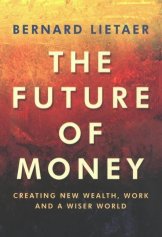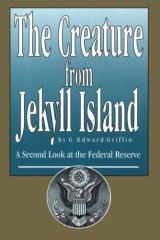Money is like an iron ring we’ve put through our noses. We’ve forgotten that we designed it and now it is leading us around.
~ Bernard Lietaer (1942 age:75), Belgian currency expert
The poverty of our century is unlike that of any other. It is not, as poverty was before, the result of natural scarcity, but of a set of priorities imposed upon the rest of the world by the rich. Consequently, the modern poor are not pitied… but written off as trash. The twentieth-century consumer economy has produced the first culture for which a beggar is a reminder of nothing.
~ John Berger (1926 age:91)
I contend that money is a disguised caste tool. Consider:
People who will not turn a shovel full of dirt on the project (Muscle Shoals Dam) nor contribute a pound of material, will collect more money from the United States that will the People who supply all the material and do all the work.
~ Thomas Alva Edison (1847-02-11 1931-10-18 age:84)
Money motivates people to do what they otherwise wouldn’t want to do.In any society there are dirty jobs that have to be done, like unclogging toilets. In theory, money rewards those people willing to tackle the most dangerous or odious jobs. Strangely though, the people with the cushiest jobs, clipping bond coupons, for example, earn the most money.
~ Philip Slater (1927-05-15 2013-06-20 age:86)
If unpaid household labour performed by both men and women in the United States were given minimum remuneration, it would equal the entire amount paid out in wages and salaries by all the corporations in the United States. So much for money as the great motivator.
~ Philip Slater (1927-05-15 2013-06-20 age:86)
You could look on money as a formal way of keeping track of who owes whom a favour. The favours are transferable. We neurotically keep track of favours as small as a penny.
Unfortunately, there are thousands of ways to cheat and fool the money system into thinking it owes you a favour even when you have not done anything for anyone else, e.g. speculating in currency, counterfeiting, selling shoddy goods, monopolistic price gouging, lending money at usurious rates…
Further, there are many favours you do for others that the monetary system ignores, such as a providing a website of useful information, volunteering or donating your time to charities.
In the bank, the most impressive building in the city, there would be people muttering to themselves like nuns counting rosaries as they toted up the invisible piles of bills. You would see some stock brokers sitting at computers all day apparently staring at a blank screen, but typing furiously.
People who play with money for a living produce nothing. They are a bit like priests of yore, who handled the sacraments.
At the theatre, people come to petition a woman behind a booth to see if they will be allowed into the theatre. If you she okays them, she gives them a ticket. She okays nearly everyone but the young and the scruffy.
Using economic power, the wealthy nations force the poor ones to labour for them at slave wages and the slaves are supposed to feel grateful for the work. The poor nations were much better off in pre-colonial days when they consumed the fruits of their own labours.
Republicans tax the poor and give tax breaks and loopholes to the wealthy. The poor then feel ashamed of not having money. They believe they don’t deserve any of the resource pie. The poor see the lack of money not as evidence of a rip-off, but of being undeserving.
Today’s official monetary system has almost nothing to do with real wealth. Just to give you an idea, 1995 statistics indicate that the volume of currency exchanged on the global level is $1.3 trillion US per day. This is thirty times more than the daily gross domestic product (GDP (Gross Domestic Product)) of all the developed countries of the world put together. of all that volume, only 2 to 3 percent has to do with real trade or investment; the remainder takes place in the speculative global cyber-casino; currency trading and speculation, for example. This means the real economy has become relegated to mere frosting on the speculative cake, an exact reversal of two decades ago.
~ Bernard Lietaer (1942 age:75) The Future of Money
 |
recommend book⇒The Future of Money: Creating New Wealth, Work and a Wiser World | |||||||||||||||||||||||||||||||||||||||||||||||||||||||
| by | Bernard Lietaer | 978-0-7126-9991-4 | paperback | |||||||||||||||||||||||||||||||||||||||||||||||||||||
|---|---|---|---|---|---|---|---|---|---|---|---|---|---|---|---|---|---|---|---|---|---|---|---|---|---|---|---|---|---|---|---|---|---|---|---|---|---|---|---|---|---|---|---|---|---|---|---|---|---|---|---|---|---|---|---|---|
| birth | 1942 age:75 | 978-0-7126-8399-9 | hardcover | |||||||||||||||||||||||||||||||||||||||||||||||||||||
| publisher | Century | 978-1-4481-4993-3 | eBook | |||||||||||||||||||||||||||||||||||||||||||||||||||||
| published | 2002-01-17 | |||||||||||||||||||||||||||||||||||||||||||||||||||||||
| Bernard Lietaer is a Belgian currency expert who helped design the Euro. He explains how money has become decoupled from real wealth. This accessible book is easier to find in British and European bookstores. | ||||||||||||||||||||||||||||||||||||||||||||||||||||||||
| ||||||||||||||||||||||||||||||||||||||||||||||||||||||||
| Greyed out stores probably do not have the item in stock. Try looking for it with a bookfinder. | ||||||||||||||||||||||||||||||||||||||||||||||||||||||||
Real wealth increases when somebody labours and produces something and decreases when that product decays or is destroyed. Money is almost fully decoupled from physical wealth.
Oddly money follows a quite different birth and death plan. Governments can print it (and spend it) or burn it any time they choose. Printing it has much the same effect as counterfeiting, decreasing the value of existing money causing inflation. Only a tiny fraction of the money in circulation is in the form of bills. Most of it the banks manufacture by a sort of slight of hand. When you deposit $100, they can lend it out. The people who borrow the money keep that same money in the bank. Therefore that same money can be lent out over and over again. Each time the banks collect interest. This is how the banks can make fabulous sums of money even when the difference between interest paid and charged is tiny. On average, every dollar you deposit is relent out 12 times. Even if the borrower spends the money, chances are the money ends back up in some bank in another account, where it can be lent out yet again. The whole thing depends on not everyone withdrawing their money at once — a bank run, since they have nowhere near enough reserves in the vaults to cover all the deposits.
Then there is the stock market which is chimera of wealth and money. Speculators bid up the price of a stock, then sell it in exchange for cash from some other speculator. Usually the price collapses, leaving the second speculator holding the bag, the victim of a semi-legal confidence game. However, sometimes the company behind the stock actually starts paying dividends and the price stays high, reflecting the true wealth of the corporation.
Only when the last tree is cut; only when the last river is polluted; only when the last fish is caught; only then will they realise that you cannot eat money.
~ Cree Indian Proverb
We laugh at the caste system in India even when we have one of our own which has even finer gradations from most lavish to deliberate degradation. We pretend it is not a caste system. I see it as just primate pecking order status on a grand scale. We forget it is just another social game. We tend to treat money as if it had independent power from the society that plays it.
 |
recommend book⇒The Creature from Jekyll Island: A Second Look at the Federal Reserve | |||||||||||||||||||||||||||||||||||||||||||||||||||||||
| by | G. Edward Griffin | 978-0-912986-39-5 | paperback | |||||||||||||||||||||||||||||||||||||||||||||||||||||
|---|---|---|---|---|---|---|---|---|---|---|---|---|---|---|---|---|---|---|---|---|---|---|---|---|---|---|---|---|---|---|---|---|---|---|---|---|---|---|---|---|---|---|---|---|---|---|---|---|---|---|---|---|---|---|---|---|
| birth | 1931-11-07 age:86 | 978-0-912986-46-3 | hardcover | |||||||||||||||||||||||||||||||||||||||||||||||||||||
| publisher | Amer | B00ARFNQ54 | kindle | |||||||||||||||||||||||||||||||||||||||||||||||||||||
| published | 2002-06 | |||||||||||||||||||||||||||||||||||||||||||||||||||||||
| Explains the big picture of how money is created and how it moves and how it motivates governments. | ||||||||||||||||||||||||||||||||||||||||||||||||||||||||
| ||||||||||||||||||||||||||||||||||||||||||||||||||||||||
| Greyed out stores probably do not have the item in stock. Try looking for it with a bookfinder. | ||||||||||||||||||||||||||||||||||||||||||||||||||||||||
This page is posted |
http://mindprod.com/money/moneyrituals.html | |
Optional Replicator mirror
|
J:\mindprod\money\moneyrituals.html | |
 |
Please read the feedback from other visitors,
or send your own feedback about the site. Contact Roedy. Please feel free to link to this page without explicit permission. | |
| Canadian
Mind
Products
IP:[65.110.21.43] Your face IP:[216.73.216.23] |
| |
| Feedback |
You are visitor number | |